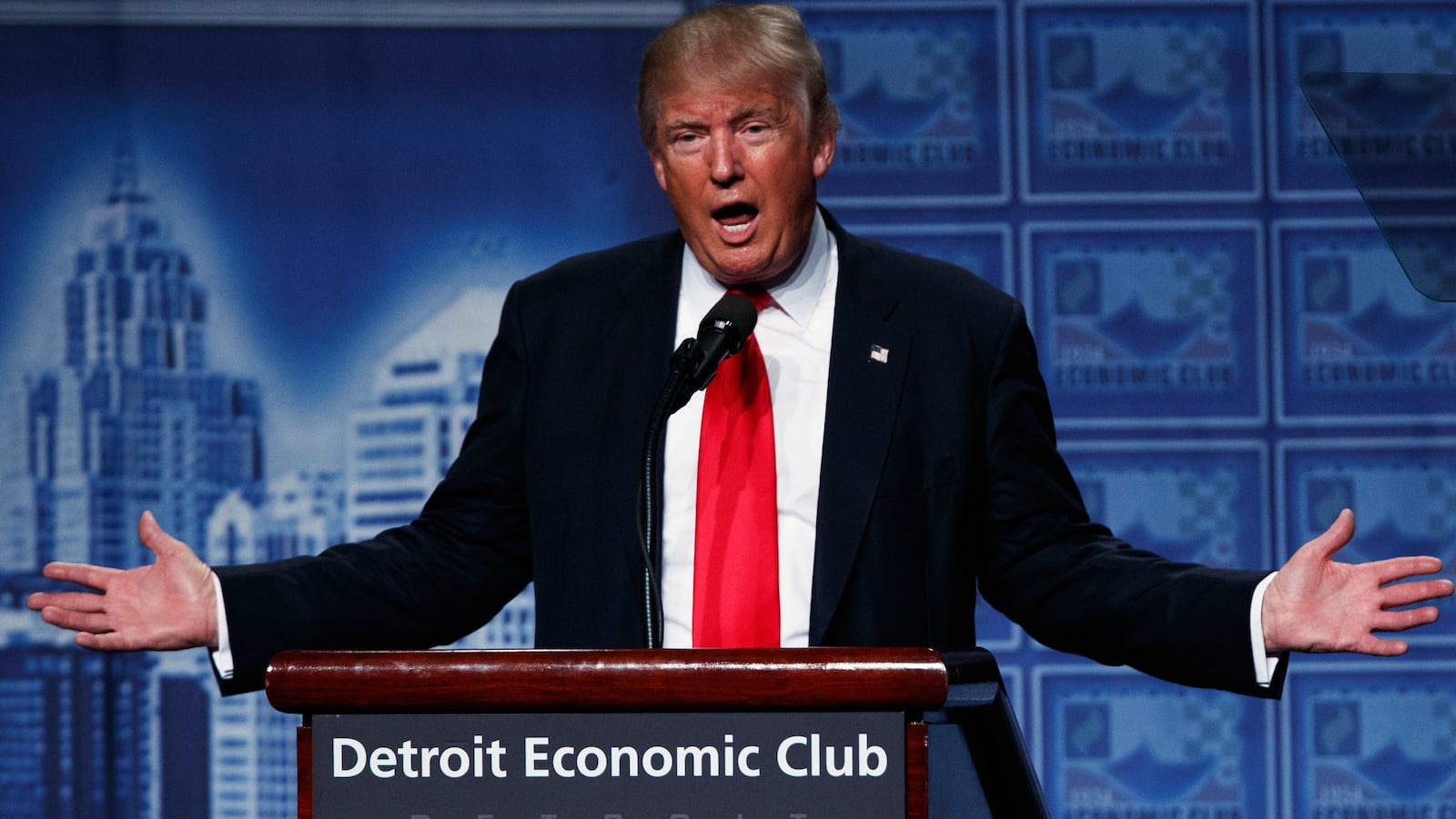Donald Trump likes to cite a certain labor-allied think tank to bolster his economic message—and they couldn’t be more embarrassed.
The Economic Policy Institute, or EPI, and its researchers are Organized Labor’s favorite wonks and no friend of the right. Mainstream, corporate-friendly conservatives regularly butt heads with them over questions about collective bargaining and free trade. In fact, they proudly consider themselves the premiere policy shop for progressive economics.
And they are not happy to be a part of Trump’s rhetorical arsenal.
Larry Mishel, the think tank’s president, said he isn’t thrilled with the association.
“No one wants to be associated with a bigot,” he said.
And, he added, Trump fits squarely in that category.
“Trump is absolutely a bigot and misogynist and he’s changed my view of White America, which is a much scarier group than I earlier believed,” he said.
Mishel added that he doesn’t think Trump really shares the group’s values. Most of his speech in Detroit focused on reducing regulations and cutting taxes, Mishel said—policies intended to tickle the fancy of the Chamber of Commerce and “all the Republican donors he’s now courting.”
But Trump seems blithely aware of any incongruity and—judging by how often he quotes them—thinks they are great.
The vast majority of political candidates, including Trump, rely heavily on think tanks’ research to make the case for their policy ideas. And politicians are usually pretty predictable about who they trust; Republicans often cite the Heritage Foundation, the American Enterprise Institute, and Manhattan Institute, and Democrats frequently turn to the Brookings Institute and the Center for American Progress.
Trump, however, hasn’t stayed in his lane. On the campaign trail, he frequently touts EPI’s research—apparently blissfully unaware that its board of directors includes some of the most powerful figures in American organized labor, including AFSCME president Lee Saunders, AFL-CIO president Richard Trumka, and American Federation of Teachers president Randi Weingarten—all of whom have endorsed Hillary Clinton.
And it receives a substantial portion of its funding from unions, as its 2015 donor disclosure page indicates.
EPI also received a grant for $200,000 in 2013 from the Open Society Foundations, a group that George Soros founded. And its site notes that it received between $100,000 and $250,000 from Soros’s group in 2015.
Activists on the right feel the same way about Soros as activists on the left feel about the Koch Brothers; they seem him as a malevolent, insidious force looking to quietly undermine the U.S. in pursuit of his own ideological agenda. In fact, in 2013 Trump tweeted a link to a Breitbart News story about Soros’s support for a group that supported the Gang of 8 immigration reform effort. And Trump praised the site for “exposing the left wing financing behind amnesty.”
It’s not that Trump has used this unusual source just once—he cites them a lot. A perusal of his emailed press statements from the last two months shows he name-checked the group more than a dozen times.
The Heritage Foundation, meanwhile, got fewer than half as many mentions. And Trump doesn’t relegate EPI to the footnotes of his press releases. In his major address on the economy that he delivered in Detroit on Monday, he mentioned the group twice. He also mentioned them in a speech he delivered at the end of June on trade—and the footnotes to that speech flagged their research a whopping 20 times, more than any other source.
Trump’s views on trade and globalization are far from Republican orthodoxy. Though most elected Republicans reflexively support free trade agreements, like the Trans-Pacific Partnership and NAFTA, Trump made his opposition to them a signature campaign issue. And yes, that’s despite the fact that his own running mate, Mike Pence, has eagerly boosted both deals.
Because Trump’s views on trade are outside the Republican mainstream, he had to leave Conservatism Inc. to find scholars that shared them. That’s how he ended up constantly broadcasting the research work of a Soros-backed think tank with Big Labor’s biggest leaders on its board.
For their part, the group has tried to distance themselves from Trump’s campaign.
Trump fans who decided to check out its website after hearing Trump mention it were greeted with a homepage headline titled “Trump is wrong on trade.”






